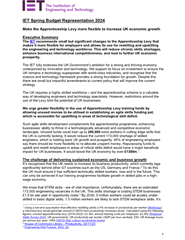Recently we submitted a representation to the Treasury’s Spring Budget 2024 where we called for the Apprenticeship levy to be made more flexible, to enable its use for upskilling and reskilling, especially for micro-credential courses. Our recent Sustainability Skills and Digital Futures surveys raise clear concerns over skills gaps and their negative industry and economic consequences.
In broad terms, we argue that unused levy funds, which are currently returned to the Treasury, could be used to train up to 280,000 workers in cutting-edge skills, for example linked to the Government’s 5 critical technologies. This could boost the UK economy by over £1380m. It would also support the Government’s Science and Technology framework, which we are pushing to be kept, whoever is next in power. Consistent and continuous underpinning support for engineering skills is essential for economic growth and prosperity.
What’s your experience of using the Apprenticeship levy? Would greater flexibility enhance delivery in your organisation? Would it alleviate skills shortages?
Let us know your views.
Read the IET’s full Spring Budget representation below.
